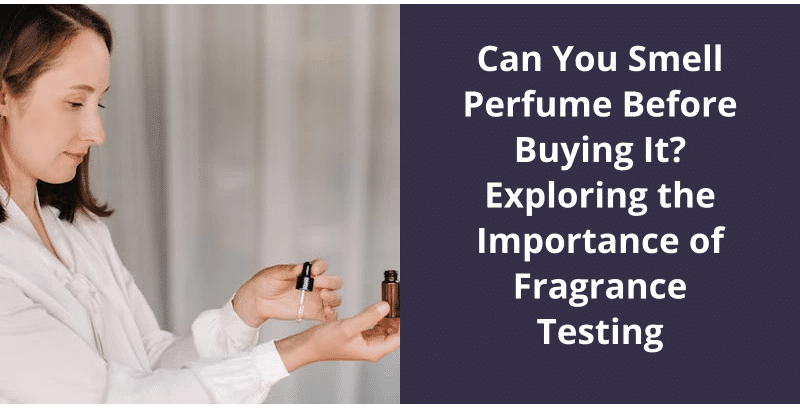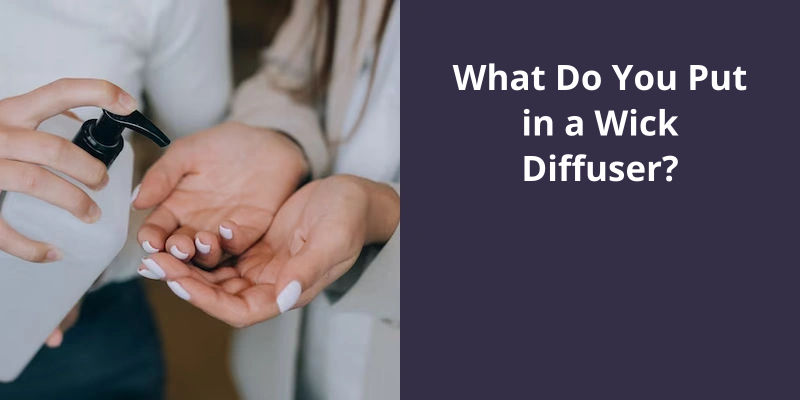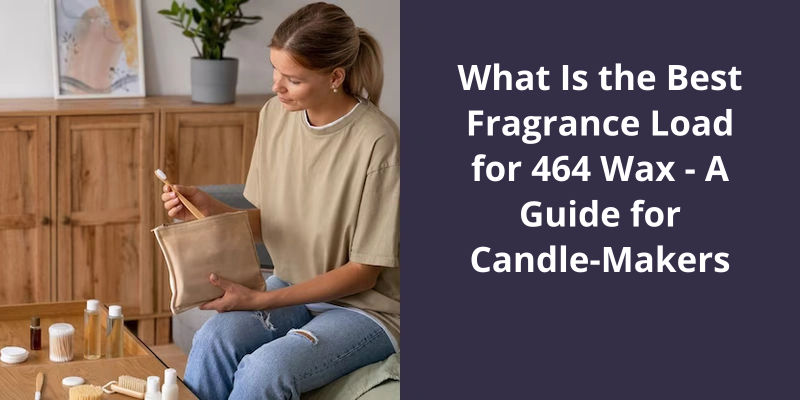Yes, you can smell perfume before buying it. It’s often important to do so because the scent of a perfume can vary based on your skin’s chemistry. Most brick-and-mortar stores have testers available for customers to try. They also provide paper strips for you to spray the fragrance on, although the true scent can better be discerned when applied to your skin. Take note, however, for online shops, this isn’t possible. When buying online, you may consider researching reviews or buying sample sizes first to ensure the scent suits your preference.

Should You Buy Perfume Without Smelling It?
According to James Craven, Perfume Archivist at Specialist Perfumery Les Senteurs, it’s always better to smell a fragrance before buying it. However, if you’re unable to do so, buying perfume online can still be a successful endeavor. While it may seem risky to purchase a fragrance without smelling it first, there are certain steps you can take to increase your chances of finding a scent you’ll love.
One option is to order a sample of the perfume you’re interested in. Many online retailers offer sample sizes for purchase, allowing you to test the fragrance before committing to a full-sized bottle. This way, you can experience the scent on your own skin and assess how it evolves throughout the day.
Another strategy is to read reviews and descriptions of the fragrance. Many online retailers provide detailed descriptions of the scent notes and overall character of the perfume. By researching these descriptions and reading reviews from others who’ve tried the fragrance, you can gain a better understanding of whether it aligns with your preferences.
They may be able to provide additional information or guidance based on your preferences and previous fragrances you’ve enjoyed.
The Pros and Cons of Blind Buying Perfume
- Pros:
- Surprise factor – Blind buying perfume allows you to discover new scents and brands that you might not have considered otherwise.
- Cost-effective – Blind buying can often be cheaper than purchasing a sample or decant.
- Excitement – Opening a package and experiencing a new fragrance for the first time can be exhilarating.
- Cons:
- Risk of disappointment – Without smelling the perfume beforehand, there’s a chance that you may not enjoy the scent once you receive it.
- Wasted money – If you don’t like the blind bought perfume, you may have wasted your money on a full bottle.
- No return policy – Some retailers don’t accept returns for perfumes that have been opened, making it difficult to return or exchange a blind bought fragrance.
However, there could be various reasons why you may not be able to smell your own perfume while others can. Factors such as the concentration of the perfume, individual differences in sensitivity to smells, or even the way the perfume interacts with your skin can all play a role. Let’s delve deeper into these possibilities and explore why this phenomenon occurs.
Can Other People Smell My Perfume When I Cant?
One intriguing phenomenon is the inability to detect our own perfume while others can smell it perfectly fine. This might leave you wondering, can other people smell my perfume when I cant? The answer lies in a fascinating concept known as “nose blindness.”
When we continuously expose ourselves to a specific scent, such as the perfume we wear regularly, our noses gradually become accustomed to the smell. Over time, our olfactory system adapts, essentially desensitizing our ability to detect the fragrance. This adaptation is similar to how our eyes adjust to a constant source of light, making it difficult to register any changes.
Interestingly, while our noses might become immune to our own perfume, strangers and acquaintances can still perceive it. This is because they’re encountering the fragrance for the first time, and their olfactory receptors aren’t desensitized like ours. Their fresh senses can accurately pick up the aroma that we’ve become blind to.
If you find yourself unable to detect your own perfume, there are certain tricks you can try to resmell it. One effective method is to smell something with a strong and distinct odor, like coffee beans or ground cinnamon. These potent scents can temporarily reset your olfactory system and help you regain your sensitivity to other fragrances, including your own perfume.
Watch this video on YouTube:
In addition to observing the scent development over time, there are other telltale signs that can help you distinguish a fake perfume from the real deal.
How Can You Tell a Fake Perfume From Smell?
There are several ways to tell if a perfume is fake, and one of the most effective methods is to simply pay attention to the scent throughout the day. When you apply a genuine perfume, you’ll notice the gradual progression of fragrance notes, from the initial burst of the top notes to the more complex middle and base notes that reveal themselves as the day goes on. This is known as the fragrance pyramid, and it’s a hallmark of a high-quality perfume.
Finally, it’s worth noting that purchasing perfumes from reputable sources is one of the best ways to avoid buying fake products. Authorized retailers and department stores are more likely to carry genuine perfumes, as they’ve relationships with the brand owners.
By paying attention to the fragrance progression, overall quality, packaging, and source of purchase, you can confidently avoid falling victim to counterfeit perfumes. Remember, a genuine perfume should captivate your senses throughout the day, showcasing the complexity and artistry of it’s fragrance composition.
Tips for Identifying Fake Perfume Based on Packaging and Labeling
When it comes to identifying fake perfumes, paying attention to the packaging and labeling can be crucial. Firstly, check the quality of the packaging. Genuine perfumes usually come in well-designed, sturdy boxes made from high-quality materials. Look for any signs of poor craftsmanship, such as uneven edges or flimsy materials.
The labeling is another important aspect to consider. Genuine perfumes have accurate and clear labeling with proper branding, including the company’s logo, name, and address. Pay attention to any spelling mistakes or blurry printing, which can be indicators of a fake product.
Additionally, scrutinize the barcode and batch code. Real perfumes have unique codes that can be verified with the manufacturer. Counterfeit perfumes often have generic or missing codes. You can contact the perfume brand or conduct an online search to authenticate the codes.
Finally, beware of significantly discounted prices and suspicious sellers. Authentic designer perfumes are rarely sold at extremely low prices. Always opt for authorized retailers or reputable online stores to reduce the risk of purchasing fake items.
Source: 14 Ways to Spot Fake Perfume – FragranceX.com
In these cases, the fragrance is still present and people around you can indeed smell it, even if you cannot. To ensure that your favorite floral perfumes last longer and can be enjoyed by others, consider applying them on areas that aren’t directly under your nose. Applying fragrance on the top of your ear or behind your knees allows the scent to disperse throughout the day without being overpowering to your own senses.
Can People Smell Your Perfume if You Can’t Smell It?
When it comes to purchasing a new perfume, one of the most important aspects for many people is the scent itself. But can you really smell the perfume before buying it? The answer is yes, but it may not be as straightforward as you think. While you may assume that if you cant smell the perfume, others won’t be able to either, this isn’t necessarily the case.
The fragrance of a perfume can actually vary depending on a number of factors, including body chemistry and skin type. What may smell amazing on one person could have a completely different scent on another. In fact, others may still be able to detect the fragrance even if you cant.
When testing perfumes, it’s important to consider where you apply the fragrance. Instead of directly applying the perfume under your nose, try applying it to areas that aren’t directly in your scent range. For example, you can apply the perfume to the top of your ear or behind your knees. This will allow you to get a better sense of the fragrance without overwhelming your sense of smell.
Additionally, it’s important to give the perfume some time to develop on your skin before making a final judgement. Perfumes have different stages, often referred to as the top, middle, and base notes. The initial scent you smell when applying the perfume is the top note, which tends to be lighter and more volatile. The middle and base notes develop over time and can add depth and richness to the fragrance. By allowing the perfume to settle and develop on your skin, you can get a better understanding of it’s true scent.
Furthermore, it can be helpful to ask for samples or small vials of the perfume to take home and try over a longer period of time. Sometimes, a perfume that initially doesn’t appeal to you may grow on you after wearing it for a while.
Tips for Choosing a Perfume That Suits Your Body Chemistry and Skin Type.
- Consider your body chemistry: Each individual has a unique body chemistry that interacts differently with perfumes. The same fragrance can smell different on different people.
- Know your skin type: Perfumes tend to last longer on oily skin as the oil helps to hold the fragrance. On the other hand, dry skin may cause the perfume to evaporate quickly.
- Understand fragrance families: Perfumes are categorized into different fragrance families such as floral, fruity, woody, and oriental. Determine which family you’re most drawn to.
- Test perfumes on your skin: Always try perfumes directly on your skin to see how it reacts and develops throughout the day. Don’t solely rely on testing strips.
- Start with lighter scents: If you’re new to wearing perfumes, begin with lighter fragrances and gradually explore stronger ones as you become comfortable.
- Consider the occasion: Different fragrances suit different occasions. Opt for fresher scents for daytime and save heavier, more intense scents for evenings or special events.
- Take your time: Don’t rush when choosing a perfume. Take your time testing multiple options and see how the fragrance evolves on your skin before making a decision.
- Consider your personal preferences: Choose a perfume that aligns with your own taste and personality. Don’t buy a fragrance just because it’s popular or recommended by others.
- Seek advice from experts: Consult fragrance experts or beauty professionals who can offer guidance based on your preferences and chemistry.
- Experiment and have fun: Perfume is an expression of individuality. Don’t be afraid to experiment with different scents and find the ones that truly resonate with you.
When it comes to buying perfume, testing it out beforehand is crucial. But how exactly do you go about doing that? The first step is to grab a scent blotter, those white cardboard strips typically found at fragrance counters. Once you’ve the blotter, spray a cloud of the perfume in a downward motion, ensuring that it reaches all parts of the strip. Then, bring the strip to your nose and take a deep inhale to get a sense of the scent. But don’t stop there – spritz your wrist with the perfume and then go about your business for 30 minutes to allow the fragrance to fully develop on your skin.
How Do You Try Perfume Before You Buy It?
When it comes to buying perfume, the experience isn’t complete without properly testing the fragrance beforehand. But how exactly can you try perfume before you buy it? The first step in the process is to start with a scent blotter. These are the white cardboard strips commonly found beside tester bottles on a fragrance counter. By spraying a small amount of the fragrance onto the blotter, you can get an initial sense of the scent.
Once you’ve the scent on the blotter, it’s time to bring it to your nose and take a sniff. This allows you to get a better understanding of the fragrance notes and whether they appeal to you. However, it’s important to note that the scent on the blotter may differ slightly from how it smells on your skin, as fragrances can react differently to different peoples body chemistry.
To get a more accurate sense of how a fragrance will smell on you personally, it’s recommended to spritz the perfume directly onto your wrist. By doing this, you can experience how the fragrance evolves over time and whether it suits your preferences. However, it’s important to keep in mind that our sense of smell can become overwhelmed when testing multiple fragrances, so it’s best to limit yourself to no more than two or three fragrances at a time.
After spritzing the perfume on your wrist, it’s a good idea to give it some time to settle and develop. This is where doing something else for around 30 minutes can be helpful. During this period, the fragrance will go through it’s various stages, allowing you to determine if you still enjoy the scent as it evolves. This is especially important because fragrances often have top, middle, and base notes that unfold over time.
Remember, everyone’s taste in fragrances is unique, so what smells great on someone else may not necessarily work for you. The goal is to find a perfume that not only smells good initially but also continues to bring enjoyment throughout the day.
Conclusion
Utilizing the white paper blotters provided in the store allows for a preliminary understanding of the fragrance's character and aids in the decision-making process. Analogous to using a clothes hanger when purchasing a new dress, these blotters offer a glimpse into how the scent might translate onto your own skin, reminding us that perfumes interact uniquely with our individual body chemistry.





